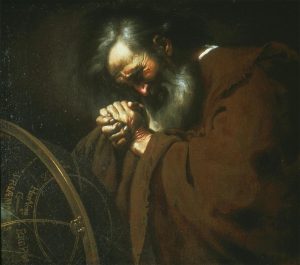Branch: Metaphysics
Approach: Monism
“Nothing endures but change.“Like many of the pre-Socratics, the philosopher Heraclitus would be remembered for his delve into Metaphysics. He attempted to explain the world around him in manageable terms. And while other philosophers sought to use scientific thinking to arrive at conclusions, Heraclitus had a slightly different approach.
Heraclitus believed that the universe was governed by a divine logos or reason. This fundamental law of the universe held all things in perfect balance. According to Heraclitus, the unity of the universe is composed of a balancing of opposites. Day becomes night and hot will become cold. The continuous changing of reality was the one fundamental constancy within the cosmos. This belief lead Heraclitus to the conclusion that all things are always in flux and that the only thing that did not change was change itself.
To Heraclitus, the nature of reality was in a constant war of change. Fire would turn to air, air would become water and water would become one with the earth. Similarly, life is followed by death and with every death there is a birth of life. This war within the nature of reality encompassed all things. It was not a process, because that would indicate that things only proceed in one direction. Rather, the universe and its constant changing was more like a circle, shifting back and forth constantly and without rest.
Heraclitus attempted to demonstrate his idea that all the universe was in flux. He used the example of a river. The philosopher stated that…
“No man ever steps in the same river twice, for it’s not the same river and he’s not the same man”.
By this he means that the moment you step into a river, the water is displaced with new water and the nature of the river is changed permanently. The man stepping in the river is also consistently changing. The man loses skin cells, his skin is made wet by the river, and he has aged every so slightly since stepping in the river. Small, unavoidable changes in both the man and the river make them different from the way they were before. This would appear to demonstrate Heraclitus’s belief that all things are changing, and that the one fundamental law of the cosmos was that everything is flux.
Read more about Heraclitus by clicking the links
-Classical Wisdom Standoff: Heraclitus vs. Parmenides (part 1)
-Classical Wisdom Standoff: Heraclitus vs. Parmenides (part 2)
-Classical Wisdom Standoff: Heraclitus vs. Parmenides (part 3)










One comment
YES:”Nothing endures but change”.
Regards from Athens,
Panagiotis Stefanides
———————-
http://www.stefanides.gr
http://www.stefanides.gr/html/Root_Geometries.htm
http://www.stefanides.gr/Html/logos.htm
Trackbacks
Our apologies, you must be logged in to post a comment.